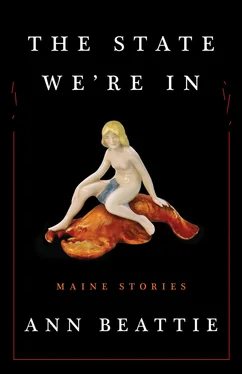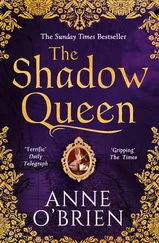“Thank you,” he said quietly. He turned to the motel owner, who held the ice bucket out to him. With his thumb in the slushy, cold water, Kunal took a step backward. He said to the owner, “What does it mean, ‘neither here nor there’?”
On their way to their summer house, the Little Hutchinsons stopped in to say hello to us every summer. If you’re curious about why they were called the Little Hutchinsons, it’s because Al Hutchinson was six foot three — a basketball player, later a coach, from North Carolina — who married a very short woman from Bangor, Maine, and together they produced three sons, the tallest about five foot seven. The other boys, including our friend Gilly (the youngest), were about my height, which is five foot two.
I’m not obsessed with height, but it’s the obvious thing to ask about someone called “little.” The Senior Hutchinsons died when their private plane went down. Neither of the older boys wanted their house, uninsulated and in need of repair, though beautifully situated above cliffs that staggered like the nude descending a staircase down to a small, pebbly beach.
Etta Rae, who had not particularly enjoyed visiting her husband, Gilly’s, parents when they were alive because of the amount of work it required helping them plant and prune flowers and bushes, making the meals, washing up… Etta Rae totally changed her impression of the house and of life in Maine after the tragedy that befell the Senior Hutchinsons. Every summer since, they’ve vacationed during June and July in the house, renting it out in August.
My husband and I live in the town you have to drive through to get to the big houses on the cliff above the beach. Our house is near the stone bungalow that used to be the library. I was quite surprised when Etta Rae asked if Marcy, their only child, might have her wedding party in our backyard. The house they inherited is a big, beautiful Victorian. There’s even a cupola at the edge of the property, though it’s lacking most of its roof. Etta Rae told me that they’d been advised that because of the direction the wind usually blew when there was a storm, a tent pitched in their backyard would be inadvisable in the event of bad weather on Marcy and Jasper’s wedding day. Marcy was marrying her third cousin, who had cut our lawn every summer when he was going to Colby. They’d met in college, having seen each other only once during their childhoods. He’d been a problem child who’d been sent away to boarding school in Baltimore when he was younger, but he’d returned to Maine for college.
Marcy was a petite girl who wore heels or platform shoes or boots with stacked heels, no matter the fashion. Her husband-to-be was even shorter. For a man, he was quite short. When Marcy and her fiancé were out walking, people sometimes collided with them because they didn’t see them coming — especially when one or the other was disembarking from a parked car. I liked Marcy, but I was less sure about Jasper, though years had passed since he’d last been called before a judge. He’d gone to drug rehab and gotten clean. Still, there was something about him I didn’t trust. I expected him to erupt someday, or to cause trouble eventually — what kind, I couldn’t have anticipated. This fear figures in the story because, as crazy as I thought the request was to use our backyard to erect a tent when they lived on beautiful property overlooking a beach, I might simply have said yes if not for the fact that I once saw Jasper deliberately run the lawn mower over a turtle. He wasn’t a child when he did this; he was a junior at Colby.
Etta Rae did not make her request in my husband’s presence. We had our annual lunch of lobster rolls and herbal iced tea at the hotel across the road from the newish park full of rugosa roses and, in recent years, an assortment of tall grasses. As we sipped our tea, she told me that anxiety about the wedding was raising her blood pressure and that her husband, Gilly, was quite upset about it. He had even, behind her back, offered to give a considerable sum of money to the young couple if they would elope. Apparently at least the groom had considered this a good idea, but their daughter very much wanted a celebration. Could they elope and would her parents still give them a party, a bit after the fact, in June or July? They would. But because two companies who erected tents had expressed doubt about the safety and security of structures pitched above the cliffs (the gazebo would hold about six people and would have been useless, even if in perfect condition), Gilly had the idea — at least according to Etta Rae — that they ask if we’d be willing, as an alternative, to have the party at our house.
I said all the expected things: How would the bridal couple feel about that? Wouldn’t they want to have the celebration inside their parents’ house if the weather was bad? It seemed that the answer was complicated by the problem of Etta Rae’s blood pressure. There were so many antiques, and she didn’t know what she would do with them. She knew that I knew how disrespectful young people were now. They’d put out a cigarette, which they’d had the nerve to light up on the step right outside the kitchen door, in a Limoges dish. One of her daughter’s friends had picked up a bisque figurine of a beckoning mermaid and used it as a back scratcher! Etta Rae always made me laugh. It makes me sound superficial, but I don’t like to hear other people’s problems, though I’ll tolerate most anything if they take me aback and make me laugh. Etta Rae was the perfect storm in that way.
I tried to change the subject, but she was having none of it. She’d already lost ten pounds, and the blood pressure had not come down. She was determined to lose more weight. She’d just bought a book called Wheat Belly and was surprised I hadn’t heard of it. She was not going to cleanse, however. (As she was elaborating on her opposition to cleansing, the waitress approached with the pitcher of iced tea, but quickly turned away before refilling our glasses.) By the time more iced tea was poured, Etta Rae had sweetened the deal (and I’m not talking sugar packet dumped in tea): she and Gilly would like to express their appreciation by giving me a day at the spa and buying Jamie an expensive putter they knew he coveted. People would tend our yard before and after the ceremony. All we had to do was say yes, save Etta Rae’s life, and enjoy the party along with fifty or so other people. I said that I’d speak to Jamie. She clasped my hand. “This is not blush on my cheeks,” she said, hovering her fingers.
As you might expect of someone who’d make this request of a friend, she’d had many ideas I thought were odd over the years. One had been to buy an empty building in Asheville, North Carolina, and to convert it to an old-age home for five couples (we could be the first to choose our floor). She sent me photographs of the building and floor plans in a mailing tube. Another time, she asked us to invest in a business that would involve protecting the reef off Key West by hiring people in shark costumes to scare people snorkeling or scuba diving, because their flippers inadvertently caused damage to the reef. She always had some crazy idea. While I found many of them amusing (not so the dreadful building she’d found in North Carolina, with fire damage and the roof caved in), I was perturbed by her most recent request.
“Let’s say no,” I said to my husband. “Why should someone have a wedding reception in our backyard, where years ago they deliberately killed a poor defenseless turtle?”
“He’s turned into a nice young man,” my husband said. “I once threw a dead raccoon down a well because I hated the people who ran the summer camp.”
Читать дальше












